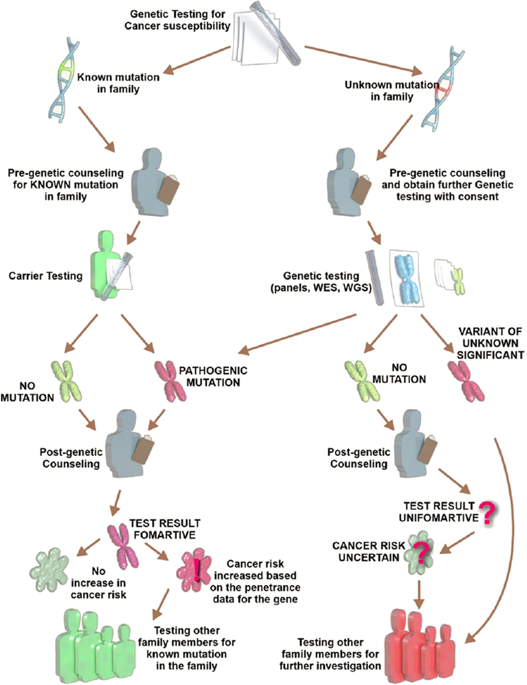当前位置:
X-MOL 学术
›
npj Genom. Med.
›
论文详情
Our official English website, www.x-mol.net, welcomes your
feedback! (Note: you will need to create a separate account there.)
Familial/inherited cancer syndrome: a focus on the highly consanguineous Arab population.
npj Genomic Medicine ( IF 4.7 ) Pub Date : 2020-02-03 , DOI: 10.1038/s41525-019-0110-y Fawz S AlHarthi 1, 2 , Alya Qari 3 , Alaa Edress 1, 2 , Malak Abedalthagafi 1
npj Genomic Medicine ( IF 4.7 ) Pub Date : 2020-02-03 , DOI: 10.1038/s41525-019-0110-y Fawz S AlHarthi 1, 2 , Alya Qari 3 , Alaa Edress 1, 2 , Malak Abedalthagafi 1
Affiliation

|
The study of hereditary cancer, which accounts for ~10% of cancer cases worldwide is an important subfield of oncology. Our understanding of hereditary cancers has greatly advanced with recent advances in sequencing technology, but as with any genetic trait, gene frequencies of cancer-associated mutations vary across populations, and most studies that have located hereditary cancer genes have been conducted on European or Asian populations. There is an urgent need to trace hereditary cancer genes across the Arab world. Hereditary disease is particularly prevalent among members of consanguineous populations, and consanguineous marriages are particularly common in the Arab world. There are also cultural and educational idiosyncrasies that differentiate Arab populations from other more thoroughly studied groups with respect to cancer awareness and treatment. Therefore, a review of the literature on hereditary cancers in this understudied population was undertaken. We report that BRCA mutations are not as prevalent among Arab breast cancer patients as they are among other ethnic groups, and therefore, other genes may play a more important role. A wide variety of germline inherited mutations that are associated with cancer are discussed, with particular attention to breast, ovarian, colorectal, prostate, and brain cancers. Finally, we describe the state of the profession of familial cancer genetic counselling in the Arab world, and the clinics and societies dedicated to its advances. We describe the complexities of genetic counselling that are specific to the Arab world. Understanding hereditary cancer is heavily dependent on understanding population-specific variations in cancer-associated gene frequencies.
中文翻译:

家族性/遗传性癌症综合症:关注高度血缘的阿拉伯人群。
占全世界癌症病例约10%的遗传性癌症研究是肿瘤学的重要子领域。随着测序技术的最新发展,我们对遗传性癌症的了解已大大提高,但是与任何遗传性状一样,与癌症相关的突变的基因频率在不同人群之间也不同,并且大多数确定遗传性癌症基因的研究都是在欧洲或亚洲人群中进行的。迫切需要在整个阿拉伯世界中追踪遗传性癌症基因。遗传病在近亲人群中尤其普遍,近亲通婚在阿拉伯世界中尤为普遍。在癌症认识和治疗方面,还有一些文化和教育特质使阿拉伯人群与其他更深入研究的人群区分开。因此,对该人群的遗传性癌症文献进行了综述。我们报告说,BRCA突变在阿拉伯乳腺癌患者中并不像在其他种族中那样普遍,因此,其他基因可能起着更重要的作用。讨论了与癌症有关的各种各样的种系遗传突变,特别注意乳腺癌,卵巢癌,结肠直肠癌,前列腺癌和脑癌。最后,我们描述了阿拉伯世界的家族性癌症遗传咨询行业的现状,以及致力于其发展的诊所和社会。我们描述了阿拉伯世界特定的遗传咨询的复杂性。了解遗传性癌症在很大程度上取决于对癌症相关基因频率的人群特异性变异的了解。
更新日期:2020-02-03
中文翻译:

家族性/遗传性癌症综合症:关注高度血缘的阿拉伯人群。
占全世界癌症病例约10%的遗传性癌症研究是肿瘤学的重要子领域。随着测序技术的最新发展,我们对遗传性癌症的了解已大大提高,但是与任何遗传性状一样,与癌症相关的突变的基因频率在不同人群之间也不同,并且大多数确定遗传性癌症基因的研究都是在欧洲或亚洲人群中进行的。迫切需要在整个阿拉伯世界中追踪遗传性癌症基因。遗传病在近亲人群中尤其普遍,近亲通婚在阿拉伯世界中尤为普遍。在癌症认识和治疗方面,还有一些文化和教育特质使阿拉伯人群与其他更深入研究的人群区分开。因此,对该人群的遗传性癌症文献进行了综述。我们报告说,BRCA突变在阿拉伯乳腺癌患者中并不像在其他种族中那样普遍,因此,其他基因可能起着更重要的作用。讨论了与癌症有关的各种各样的种系遗传突变,特别注意乳腺癌,卵巢癌,结肠直肠癌,前列腺癌和脑癌。最后,我们描述了阿拉伯世界的家族性癌症遗传咨询行业的现状,以及致力于其发展的诊所和社会。我们描述了阿拉伯世界特定的遗传咨询的复杂性。了解遗传性癌症在很大程度上取决于对癌症相关基因频率的人群特异性变异的了解。

















































 京公网安备 11010802027423号
京公网安备 11010802027423号